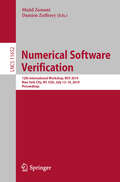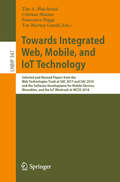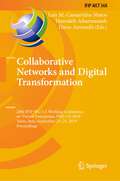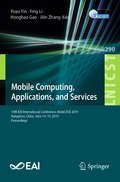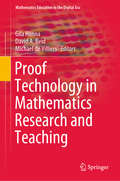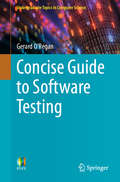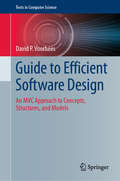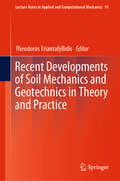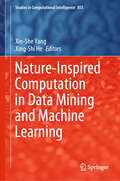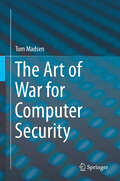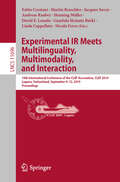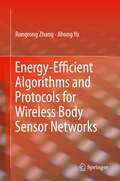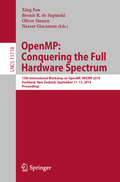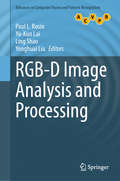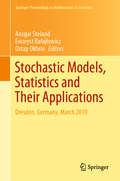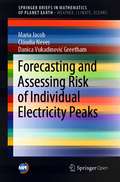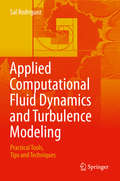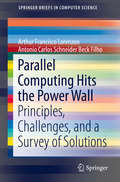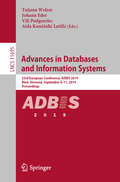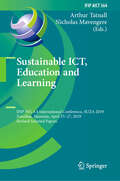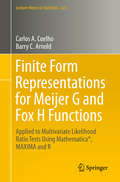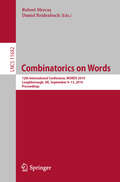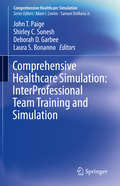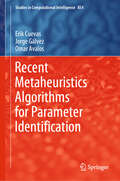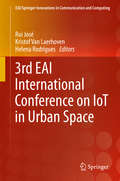- Table View
- List View
Numerical Software Verification: 12th International Workshop, NSV 2019, New York City, NY, USA, July 13–14, 2019, Proceedings (Lecture Notes in Computer Science #11652)
by Majid Zamani Damien ZuffereyThis book constitutes the proceedings of the 12th International Workshop on Numerical Software Verification, NSV 2019, held in New York City, NY, USA, in July 2019 - colocated with the International Conference on Computer Aided Verification, CAV 2019. The 5 full papers presented together with 2 short papers, 3 abstracts of invited talks, and 2 tutorial papers were carefully reviewed and selected from numerous submissions. The NSV 2017 workshop is dedicated to the development of logical and mathematical techniques for the reasoning about programmability and reliability.
Towards Integrated Web, Mobile, and IoT Technology: Selected and Revised Papers from the Web Technologies Track at SAC 2017 and SAC 2018, and the Software Development for Mobile Devices, Wearables, and the IoT Minitrack at HICSS 2018 (Lecture Notes in Business Information Processing #347)
by Tim A. Majchrzak Cristian Mateos Francesco Poggi Tor-Morten GrønliThis book deals with integrated Web, mobile, and IoT technologies. Novel approaches and techniques, new tools and frameworks are needed to address the increasing complexity of the distributed computing paradigms that are coming and the applications therein.This volume contains selected and extended papers from a) the Web Technologies track at the 33rd ACM/SIGAPP Symposium On Applied Computing, b) the Web Technologies track at the 32nd ACM/SIGAPP Symposium On Applied Computing, and c) the Software Development for Mobile Devices, Wearables, and the Internet-of-Things Minitrack at the 51st Hawaii International Conference on System Sciences. Overall, it provides a uniform view of cutting-edge research in Web, mobile and IoT technologies.
Collaborative Networks and Digital Transformation: 20th IFIP WG 5.5 Working Conference on Virtual Enterprises, PRO-VE 2019, Turin, Italy, September 23–25, 2019, Proceedings (IFIP Advances in Information and Communication Technology #568)
by Luis M. Camarinha-Matos Hamideh Afsarmanesh Dario AntonelliThis book constitutes the refereed proceedings of the 20th IFIP WG 5.5 Working Conference on Virtual Enterprises, PRO-VE 2019, held in Turin, Italy, in September 2019. The 56 revised full papers were carefully reviewed and selected from 141 submissions. They provide a comprehensive overview of major challenges and recent advances in various domains related to the digital transformation and collaborative networks and their applications with a strong focus on the following areas related to the main theme of the conference: collaborative models, platforms and systems for digital revolution; manufacturing ecosystem and collaboration in Industry 4.0; big data analytics and intelligence; risk, performance, and uncertainty in collaborative networked systems; semantic data/service discovery, retrieval, and composition in a collaborative networked world; trust and sustainability analysis in collaborative networks; value creation and social impact of collaborative networks on the digital revolution; technology development platforms supporting collaborative systems; collective intelligence and collaboration in advanced/emerging applications; and collaborative manufacturing and factories of the future, e-health and care, food and agribusiness, and crisis/disaster management.
Mobile Computing, Applications, and Services: 10th EAI International Conference, MobiCASE 2019, Hangzhou, China, June 14–15, 2019, Proceedings (Lecture Notes of the Institute for Computer Sciences, Social Informatics and Telecommunications Engineering #290)
by Yuyu Yin Ying Li Honghao Gao Jilin ZhangThis book constitutes the thoroughly refereed post-conference proceedings of the 10th International Conference on Mobile Computing, Applications, and Services, MobiCASE 2019, held in Hangzhou, China, in June 2019. The 17 full papers were carefully reviewed and selected from 48 submissions. The papers are organized in topical sections on mobile application with data analysis, mobile application with AI, edge computing, energy optimization and application
Proof Technology in Mathematics Research and Teaching (Mathematics Education in the Digital Era #14)
by Gila Hanna David A. Reid Michael De VilliersThis book presents chapters exploring the most recent developments in the role of technology in proving. The full range of topics related to this theme are explored, including computer proving, digital collaboration among mathematicians, mathematics teaching in schools and universities, and the use of the internet as a site of proof learning. Proving is sometimes thought to be the aspect of mathematical activity most resistant to the influence of technological change. While computational methods are well known to have a huge importance in applied mathematics, there is a perception that mathematicians seeking to derive new mathematical results are unaffected by the digital era. The reality is quite different. Digital technologies have transformed how mathematicians work together, how proof is taught in schools and universities, and even the nature of proof itself. Checking billions of cases in extremely large but finite sets, impossible a few decades ago, has now become a standard method of proof. Distributed proving, by teams of mathematicians working independently on sections of a problem, has become very much easier as digital communication facilitates the sharing and comparison of results. Proof assistants and dynamic proof environments have influenced the verification or refutation of conjectures, and ultimately how and why proof is taught in schools. And techniques from computer science for checking the validity of programs are being used to verify mathematical proofs. Chapters in this book include not only research reports and case studies, but also theoretical essays, reviews of the state of the art in selected areas, and historical studies. The authors are experts in the field.
Concise Guide to Software Testing (Undergraduate Topics in Computer Science)
by Gerard O'ReganThis practically-focused textbook provides a concise and accessible introduction to the field of software testing, explaining the fundamental principles and offering guidance on applying the theory in an industrial environment.Topics and features: presents a brief history of software quality and its influential pioneers, as well as a discussion of the various software lifecycles used in software development; describes the fundamentals of testing in traditional software engineering, and the role that static testing plays in building quality into a product; explains the process of software test planning, test analysis and design, and test management; discusses test outsourcing, and test metrics and problem solving; reviews the tools available to support software testing activities, and the benefits of a software process improvement initiative; examines testing in the Agile world, and the verification of safety critical systems; considers the legal and ethical aspects of software testing, and the importance of software configuration management; provides key learning topics and review questions in every chapter, and supplies a helpful glossary at the end of the book.This easy-to-follow guide is an essential resource for undergraduate students of computer science seeking to learn about software testing, and how to build high quality and reliable software on time and on budget. The work will also be of interest to industrialists including software engineers, software testers, quality professionals and software managers, as well as the motivated general reader.
Guide to Efficient Software Design: An MVC Approach to Concepts, Structures, and Models (Texts in Computer Science)
by David P. VoorheesThis classroom-tested textbook presents an active-learning approach to the foundational concepts of software design. These concepts are then applied to a case study, and reinforced through practice exercises, with the option to follow either a structured design or object-oriented design paradigm. The text applies an incremental and iterative software development approach, emphasizing the use of design characteristics and modeling techniques as a way to represent higher levels of design abstraction, and promoting the model-view-controller (MVC) architecture.Topics and features: provides a case study to illustrate the various concepts discussed throughout the book, offering an in-depth look at the pros and cons of different software designs; includes discussion questions and hands-on exercises that extend the case study and apply the concepts to other problem domains; presents a review of program design fundamentals to reinforce understanding of the basic concepts; focuses on a bottom-up approach to describing software design concepts; introduces the characteristics of a good software design, emphasizing the model-view-controller as an underlying architectural principle; describes software design from both object-oriented and structured perspectives; examines additional topics on human-computer interaction design, quality assurance, secure design, design patterns, and persistent data storage design; discusses design concepts that may be applied to many types of software development projects; suggests a template for a software design document, and offers ideas for further learning.Students of computer science and software engineering will find this textbook to be indispensable for advanced undergraduate courses on programming and software design. Prior background knowledge and experience of programming is required, but familiarity in software design is not assumed.
Recent Developments of Soil Mechanics and Geotechnics in Theory and Practice (Lecture Notes in Applied and Computational Mechanics #91)
by Theodoros TriantafyllidisThis book provides essential insights into recent developments in fundamental geotechnical engineering research. Special emphasis is given to a new family of constitutive soil description methods, which take into account the recent loading history and the dilatancy effects. Particular attention is also paid to the numerical implementation of multi-phase material under dynamic loads, and to geotechnical installation processes. In turn, the book addresses implementation problems concerning large deformations in soils during piling operations or densification processes, and discusses the limitations of the respective methods. Numerical simulations of dynamic consolidation processes are presented in slope stability analysis under seismic excitation. Lastly, achieving the energy transition from conventional to renewable sources will call for geotechnical expertise. Consequently, the book explores and analyzes a selection of interesting problems involving the stability and serviceability of supporting structures, and provides new solutions approaches for practitioners and scientists in geotechnical engineering. The content reflects the outcomes of the Colloquium on Geotechnical Engineering 2019 (Geotechnik Kolloquium), held in Karlsruhe, Germany in September 2019.
Nature-Inspired Computation in Data Mining and Machine Learning (Studies in Computational Intelligence #855)
by Xin-She Yang Xing-Shi HeThis book reviews the latest developments in nature-inspired computation, with a focus on the cross-disciplinary applications in data mining and machine learning. Data mining, machine learning and nature-inspired computation are current hot research topics due to their importance in both theory and practical applications. Adopting an application-focused approach, each chapter introduces a specific topic, with detailed descriptions of relevant algorithms, extensive literature reviews and implementation details. Covering topics such as nature-inspired algorithms, swarm intelligence, classification, clustering, feature selection, cybersecurity, learning algorithms over cloud, extreme learning machines, object categorization, particle swarm optimization, flower pollination and firefly algorithms, and neural networks, it also presents case studies and applications, including classifications of crisis-related tweets, extraction of named entities in the Tamil language, performance-based prediction of diseases, and healthcare services. This book is both a valuable a reference resource and a practical guide for students, researchers and professionals in computer science, data and management sciences, artificial intelligence and machine learning.
The Art of War for Computer Security
by Tom MadsenIn this book the author draws inspiration from Sun Tzu's Art of War, a work that explains conflict between nations, and he applies this to the computer security setting, examining how we should consider protecting information systems from accidents or malicious attacks. The author first briefly introduces Sun Tzu. Then each chapter in the book takes its inspiration from an original title in The Art of War, where the author offers a general introduction to the content and then describes its application in a cybersecurity setting. These chapters cover estimates; waging war; offensive strategy; how you prepare for an attack; energy; weaknesses and strengths; the variables that need consideration before embarking on a war; how infrastructure is related to the concept of ground; attack by fire or how skilled attackers hide behind noise; and employing secret agents. The book will be interesting for computer security researchers and professionals who would like some grounding in a security mindset.
Experimental IR Meets Multilinguality, Multimodality, and Interaction: 10th International Conference of the CLEF Association, CLEF 2019, Lugano, Switzerland, September 9–12, 2019, Proceedings (Lecture Notes in Computer Science #11696)
by Fabio Crestani Martin Braschler Jacques Savoy Andreas Rauber Henning Müller David E. Losada Gundula Heinatz Bürki Linda Cappellato Nicola FerroThis book constitutes the refereed proceedings of the 10th International Conference of the CLEF Association, CLEF 2019, held in Lugano, Switzerland, in September 2019.The conference has a clear focus on experimental information retrieval with special attention to the challenges of multimodality, multilinguality, and interactive search ranging from unstructured to semi structures and structured data. The 7 full papers and 8 short papers presented in this volume were carefully reviewed and selected from 30 submissions. This year, many contributions tackle the social networks with the detection of stances or early identification of depression signs on Twitter in a cross-lingual context. Further this volume presents 7 “best of the labs” papers which were reviewed as a full paper submission with the same review criteria. The labs represented scientific challenges based on new data sets and real world problems in multimodal and multilingual information access. In addition to this, 9 benchmarking labs reported results of their yearlong activities in overview talks and lab sessions.
Energy-Efficient Algorithms and Protocols for Wireless Body Sensor Networks
by Rongrong Zhang Jihong YuThis book provides a systematic treatment of the theoretical foundation and algorithmic tools necessary in the design of energy-efficient algorithms and protocols in wireless body sensor networks (WBSNs). These problems addressed in the book are of both fundamental and practical importance. Specifically, the book delivers a comprehensive treatment on the following problems ranging from theoretical modeling and analysis, to practical algorithm design and optimization: energy-efficient clustering-based leader election algorithms in WBSNs; MAC protocol for duty-cycling WBSNs with concurrent traffic; multi-channel broadcast algorithms in duty-cycling WBSNs; and energy-efficient sleep scheduling algorithms in WBSNs. Target readers of the book are researchers and advanced-level engineering students interested in acquiring in-depth knowledge on the topic and on WBSNs and their applications, both from theoretical and engineering perspective.
OpenMP: 15th International Workshop on OpenMP, IWOMP 2019, Auckland, New Zealand, September 11–13, 2019, Proceedings (Lecture Notes in Computer Science #11718)
by Xing Fan Bronis R. de Supinski Oliver Sinnen Nasser GiacamanThis book constitutes the proceedings of the 15th International Workshop on Open MP, IWOMP 2019, held in Auckland, New Zealand, in September 2019. The 22 full papers presented in this volume were carefully reviewed and selected for inclusion in this book. The papers are organized in topical sections named: best paper; tools, accelerators, compilation, extensions, tasking, and using OpenMP.
RGB-D Image Analysis and Processing (Advances in Computer Vision and Pattern Recognition)
by Paul L. Rosin Yu-Kun Lai Ling Shao Yonghuai LiuThis book focuses on the fundamentals and recent advances in RGB-D imaging as well as covering a range of RGB-D applications. The topics covered include: data acquisition, data quality assessment, filling holes, 3D reconstruction, SLAM, multiple depth camera systems, segmentation, object detection, salience detection, pose estimation, geometric modelling, fall detection, autonomous driving, motor rehabilitation therapy, people counting and cognitive service robots. The availability of cheap RGB-D sensors has led to an explosion over the last five years in the capture and application of colour plus depth data. The addition of depth data to regular RGB images vastly increases the range of applications, and has resulted in a demand for robust and real-time processing of RGB-D data. There remain many technical challenges, and RGB-D image processing is an ongoing research area. This book covers the full state of the art, and consists of a series of chapters by internationally renowned experts in the field. Each chapter is written so as to provide a detailed overview of that topic. RGB-D Image Analysis and Processing will enable both students and professional developers alike to quickly get up to speed with contemporary techniques, and apply RGB-D imaging in their own projects.
Stochastic Models, Statistics and Their Applications: Dresden, Germany, March 2019 (Springer Proceedings in Mathematics & Statistics #294)
by Ansgar Steland Ewaryst Rafajłowicz Ostap OkhrinThis volume presents selected and peer-reviewed contributions from the 14th Workshop on Stochastic Models, Statistics and Their Applications, held in Dresden, Germany, on March 6-8, 2019. Addressing the needs of theoretical and applied researchers alike, the contributions provide an overview of the latest advances and trends in the areas of mathematical statistics and applied probability, and their applications to high-dimensional statistics, econometrics and time series analysis, statistics for stochastic processes, statistical machine learning, big data and data science, random matrix theory, quality control, change-point analysis and detection, finance, copulas, survival analysis and reliability, sequential experiments, empirical processes, and microsimulations. As the book demonstrates, stochastic models and related statistical procedures and algorithms are essential to more comprehensively understanding and solving present-day problems arising in e.g. the natural sciences, machine learning, data science, engineering, image analysis, genetics, econometrics and finance.
Forecasting and Assessing Risk of Individual Electricity Peaks (Mathematics of Planet Earth)
by Maria Jacob Cláudia Neves Danica Vukadinović GreethamThe overarching aim of this open access book is to present self-contained theory and algorithms for investigation and prediction of electric demand peaks. A cross-section of popular demand forecasting algorithms from statistics, machine learning and mathematics is presented, followed by extreme value theory techniques with examples.In order to achieve carbon targets, good forecasts of peaks are essential. For instance, shifting demand or charging battery depends on correct demand predictions in time. Majority of forecasting algorithms historically were focused on average load prediction. In order to model the peaks, methods from extreme value theory are applied. This allows us to study extremes without making any assumption on the central parts of demand distribution and to predict beyond the range of available data. While applied on individual loads, the techniques described in this book can be extended naturally to substations, or to commercial settings. Extreme value theory techniques presented can be also used across other disciplines, for example for predicting heavy rainfalls, wind speed, solar radiation and extreme weather events. The book is intended for students, academics, engineers and professionals that are interested in short term load prediction, energy data analytics, battery control, demand side response and data science in general.
Applied Computational Fluid Dynamics and Turbulence Modeling: Practical Tools, Tips and Techniques
by Sal RodriguezThis unique text provides engineering students and practicing professionals with a comprehensive set of practical, hands-on guidelines and dozens of step-by-step examples for performing state-of-the-art, reliable computational fluid dynamics (CFD) and turbulence modeling. Key CFD and turbulence programs are included as well. The text first reviews basic CFD theory, and then details advanced applied theories for estimating turbulence, including new algorithms created by the author. The book gives practical advice on selecting appropriate turbulence models and presents best CFD practices for modeling and generating reliable simulations. The author gathered and developed the book’s hundreds of tips, tricks, and examples over three decades of research and development at three national laboratories and at the University of New Mexico—many in print for the first time in this book. The book also places a strong emphasis on recent CFD and turbulence advancements found in the literature over the past five to 10 years. Readers can apply the author’s advice and insights whether using commercial or national laboratory software such as ANSYS Fluent, STAR-CCM, COMSOL, Flownex, SimScale, OpenFOAM, Fuego, KIVA, BIGHORN, or their own computational tools. Applied Computational Fluid Dynamics and Turbulence Modeling is a practical, complementary companion for academic CFD textbooks and senior project courses in mechanical, civil, chemical, and nuclear engineering; senior undergraduate and graduate CFD and turbulence modeling courses; and for professionals developing commercial and research applications.
Parallel Computing Hits the Power Wall: Principles, Challenges, and a Survey of Solutions (SpringerBriefs in Computer Science)
by Arthur Francisco Lorenzon Antonio Carlos Beck FilhoThis book describes several approaches to adaptability that are applied for the optimization of parallel applications, such as thread-level parallelism exploitation and dynamic voltage and frequency scaling on multicore systems.This book explains how software developers can apply a novel technique to adapt the number of threads at runtime without any modification in the source code nor recompilation.This book is useful for software developers in general since it offers realistic examples throughout to demonstrate various techniques presented.
Advances in Databases and Information Systems: 23rd European Conference, ADBIS 2019, Bled, Slovenia, September 8–11, 2019, Proceedings (Lecture Notes in Computer Science #11695)
by Tatjana Welzer Johann Eder Vili Podgorelec Aida Kamišalić LatifićThis book constitutes the proceedings of the 23rd European Conference on Advances in Databases and Information Systems, ADBIS 2019, held in Bled, Slovenia, in September 2019.The 27 full papers presented were carefully reviewed and selected from 103 submissions. The papers cover a wide range of topics from different areas of research in database and information systems technologies and their advanced applications from theoretical foundations to optimizing index structures. They focus on data mining and machine learning, data warehouses and big data technologies, semantic data processing, and data modeling. They are organized in the following topical sections: data mining; machine learning; document and text databases; big data; novel applications; ontologies and knowledge management; process mining and stream processing; data quality; optimization; theoretical foundation and new requirements; and data warehouses.
Sustainable ICT, Education and Learning: IFIP WG 3.4 International Conference, SUZA 2019, Zanzibar, Tanzania, April 25–27, 2019, Revised Selected Papers (IFIP Advances in Information and Communication Technology #564)
by Arthur Tatnall Nicholas MavengereThis book constitutes the refereed post-conference proceedings of the First IFIP WG 3.4 International Conference on Sustainable ICT, Education, and Learning, SUZA 2019, held in Zanzibar, Tanzania, in April 2019, in conjunction with the 15th IFIP WG 9.4 International Conference on Social Implications of Computers in Developing Countries.The 27 revised full papers presented in this volume were carefully reviewed and selected from 41 submissions. The papers cover topics such as peer and collaborative learning in informatics; pedagogical approaches to teaching specific informatics courses; workplace learning related to information systems; e-learning; ICTs for development; mobile solutions in learning in the North and South; lifelong learning; applications for disabled students; traversal skills and computational thinking; and teacher education in the global South.
Finite Form Representations for Meijer G and Fox H Functions: Applied to Multivariate Likelihood Ratio Tests Using Mathematica®, MAXIMA and R (Lecture Notes in Statistics #223)
by Carlos A. Coelho Barry C. ArnoldThis book depicts a wide range of situations in which there exist finite form representations for the Meijer G and the Fox H functions. Accordingly, it will be of interest to researchers and graduate students who, when implementing likelihood ratio tests in multivariate analysis, would like to know if there exists an explicit manageable finite form for the distribution of the test statistics. In these cases, both the exact quantiles and the exact p-values of the likelihood ratio tests can be computed quickly and efficiently.The test statistics in question range from common ones, such as those used to test e.g. the equality of means or the independence of blocks of variables in real or complex normally distributed random vectors; to far more elaborate tests on the structure of covariance matrices and equality of mean vectors. The book also provides computational modules in Mathematica®, MAXIMA and R, which allow readers to easily implement, plot and compute the distributions of any of these statistics, or any other statistics that fit into the general paradigm described here.
Combinatorics on Words: 12th International Conference, WORDS 2019, Loughborough, UK, September 9–13, 2019, Proceedings (Lecture Notes in Computer Science #11682)
by Robert Mercaş Daniel ReidenbachThis book constitutes the refereed proceedings of the 12th International Conference on Combinatorics on Words, WORDS 2019, held in Loughborough, UK, in September 2019. The 21 revised full papers presented in this book together with 5 invited talks were carefully reviewed and selected from 34 submissions. WORDS is the main conference series devoted to the mathematical theory of words. In particular, the combinatorial, algebraic and algorithmic aspects of words are emphasized. Motivations may also come from other domains such as theoretical computer science, bioinformatics, digital geometry, symbolic dynamics, numeration systems, text processing, number theory, etc.
Comprehensive Healthcare Simulation: Interprofessional Team Training And Simulation (Comprehensive Healthcare Simulation)
by John T. Paige Shirley C. Sonesh Deborah D. Garbee Laura S. BonannoThis book focuses on InterProfessional (IP) Team Training and Simulation, from basic concepts to the practical application of IP in different healthcare settings. It thoroughly and comprehensively covers the role of simulation in healthcare, human factors in healthcare, challenges to conducting simulation-based IP, logistics, and applications of simulation-based IP in clinical practice. Supplemented by high-quality figures and tables, readers are introduced to the different simulation modalities and technologies employed in IP team training and are guided on the use of simulation within IP teams.Part of the authoritative Comprehensive Healthcare Simulation Series, InterProfessional Team Training and Simulation can be used in training for a variety of learners, including medical students, residents, practicing physicians, nurses, and health-related professionals.
Recent Metaheuristics Algorithms for Parameter Identification (Studies in Computational Intelligence #854)
by Erik Cuevas Jorge Gálvez Omar AvalosThis book presents new, alternative metaheuristic developments that have proved to be effective in various complex problems to help researchers, lecturers, engineers, and practitioners solve their own optimization problems. It also bridges the gap between recent metaheuristic techniques and interesting identification system methods that benefit from the convenience of metaheuristic schemes by explaining basic ideas of the proposed applications in ways that can be understood by readers new to these fields. As such it is a valuable resource for energy practitioners who are not researchers in metaheuristics. In addition, it offers members of the metaheuristic community insights into how system identification and energy problems can be translated into optimization tasks.
3rd EAI International Conference on IoT in Urban Space (EAI/Springer Innovations in Communication and Computing)
by Rui José Kristof Van Laerhoven Helena RodriguesThis proceedings presents the papers from Urb-IoT 2018 - 3rd EAI International Conference on IoT in Urban Space, which took place in Guimarães, Portugal on 21-22 November 2018. The conference aims to explore the emerging dynamics within the scope of the Internet of Things (IoT) and the new science of cities.The papers discuss fusion of heterogeneous urban sources, understanding urban data using machine learning and mining techniques, urban analytics, urban IoT infrastructures, crowd sourcing techniques, incentification and gamification, urban mobility and intelligent transportation systems, real time urban information systems, and more. The proceedings discuss innovative technologies that navigate industry and connectivity sectors in transportation, utility, public safety, healthcare, and education. The authors also discuss the increasing deployments of IoT technologies and the rise of the so-called 'Sensored Cities'‚ which are opening up new avenues of research opportunities towards that future.
